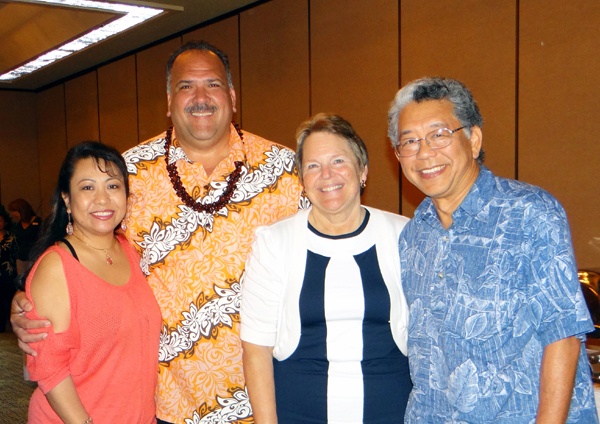LIHU‘E — When it comes to Obamacare, Hawai‘i is ready. Tom Matsuda, Affordable Care Act implementation manager for Gov. Neil Abercrombie, told the Filipino Chamber of Commerce that Hawai‘i is a leader when it comes to expectations of the states
LIHU‘E — When it comes to Obamacare, Hawai‘i is ready.
Tom Matsuda, Affordable Care Act implementation manager for Gov. Neil Abercrombie, told the Filipino
Chamber of Commerce that Hawai‘i is a leader when it comes to expectations of the states under the ACA.
“Hawai‘i is ahead of most states because of the way we dealt with health care over the years, and especially with the Prepaid Health Care Act,” the Honolulu attorney said Tuesday at Kaua‘i Beach Resort.
Matsuda is tasked to help state government agencies interpret federal law regarding ACA as it stands to effect various department operations. He also explained how large and small businesses would adjust to scope of changes from something so “ambitious and huge.”
The plan is to continue developing a comprehensive health care plan that improves the health of the population.
“We view the Affordable Care Act as a stepping stone to make that happen,” he said.
Matsuda said the state will not reduce quality care where it is above the mark.
“We are trying to increase the quality of health care, the health of citizens, the economic value and affordability of care throughout the state, and in a way that fits with the culture and geography of a unique state,” he said.
The “Patient Protection & Affordable Care Act” was declared constitutional by the U.S. Supreme Court in June 2012. The state is working to implement the federal law by Jan. 1, 2014, and it is no longer about politics, he said.
“We are not looking at it as plus or minus,” Matsuda said. “It’s the law, with rules and deadlines to comply. It is coming.”
Ninety people from the public and private sector around the state, are working in eight groups to prepare a draft plan to implement the ACA in Hawai‘i. After presenting it for public response in July, a final draft will go to the governor for approval to submit with the federal application in September, he said.
The task force makes notes of where improvement is needed, he said.
Some concerns are with physician availability, and the streamlining of a system that encompasses several insurance plans, and with adjusting large business standards from 50 employees as it stands now in Hawai‘i, to the federal level of 100.
Small businesses will not be required to provide insurance for their employees. The ACA will require individuals and the self-employed to use an online health exchange that works in the same way the travel sites present several airline options in one search.
The Hawai’i Health Connector (hawaiihealthconnector.com) was established by the Legislature in 2011 in accordance with the Affordable Care Act. The “one-stop-shop” exchange enrollment for individuals and small businesses will bring transparency to encourage affordability and quality in the marketplace, as well as expedite eligibility, Matsuda said.
The ACA provides tax credits for small business and nonprofit employer contributions. A tax accountant can help amend returns dating back to Jan 1, 2010 if eligible, Matsuda said.
Large businesses have a different set of insurance requirements based on access, affordability and quality, he said. Failing to comply could result in penalties of up to $3,000 per year for each employee.
“Because of the Prepaid Health Care Act already passed in Hawai‘i, the large employers are already meeting the standards under the federal law,” Matsuda said.
The Prepaid Act also satisfies requirements for ACA individual mandates, from coverage for children to age 26 under a parent’s plan, and for some preventive care services at no additional cost to the employee, he said.
“In order to keep Prepaid intact, it is necessary that Hawai‘i establish a state-based exchange,” he said.
The timetable for open enrollment begins Oct. 1. Changes to employer plans and insurance products are ongoing.
The exchanges will be operational on Jan. 1, 2014. Enhanced tax credits will increase to 50 percent for small businesses and 35 percent for nonprofits that use the exchange.
Large group employers may participate in 2017, if they were not eligible to participate in 2014, he added.
The cost to implement ACA will likely make health insurance premiums more expensive at first, Matsuda said. The theory is that in the long term the fast rising curve at present will begin to bend and then flatten.
• Tom LaVenture, staff writer, can be reached at 245-0424 or tlaventure@thegardenisland.com.


